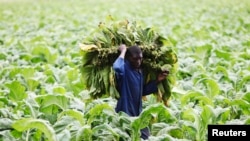Farmers in Zimbabwe say they have been forced to sell the seeds and fertilizers supplied by the government for the 2015-2016 planting season to avert a current hunger crisis. Diverting the farm supplies will have an effect beyond the agricultural industry.
At the height of Zimbabwe’s farming season, the Sanyati farming area some 250 kilometers southwest of Harare normally would produce lots of cotton. It is an important income-earning multi-purpose crop, spun into fabric for exports while its seeds are processed into cooking oil for local use.
However, for many farmers that is no longer the case. Thirty-four-year-old farmer Titus Maphosa said cotton prices have declined so much it is now unprofitable.
He said that for years he has been growing cotton. But now, he said, it was causing hunger. He said he sold the fertilizer he received from the government for $20 a bag, others actually sold it for $10 a bag. "Others are putting it in their maize fields. We will not grow cotton," he said.
After the government noticed a decline in cotton production in the Sanyati area over the past years -- and a rise in the number of people asking for food handouts -- it began giving free insecticides, herbicides, seed and fertilizer to farmers. But farmer Muteewa Majasi said that would not work unless the government addressed falling cotton prices.
He said, "the government must first tell us the price so that we can decide to take supplies or not. They might offer us a lower price than last season of three cents a kilogram, now they might offer us two cents or one cent. It is not clear. It’s help, but they are not being helpful."
Majasi said farmers have no options and are being forced. The government might force them to sell at whatever price, since it gave them seeds and fertilizers. So, the government must first consult farmers on which crops they want to grow - whether it be maize or sorghum, he said.
A government official in the area - who requested anonymity to speak freely, concurs with the farmers. He said many take whatever the government offers because it is the only way to get a bag of fertilizer. He said the farmers would take the cotton seed, but not grow the crop and instead use the fertilizer for maize production.
But the official said that practice did not produce enough maize to stave off hunger and poverty in Zimbabwe.
This comes at a time when the United Nations Food and Agriculture Organization warns the southern African region faces the possibility of floods and droughts induced by the El Nino weather phenomenon – which is predicted to be the worst since 1997.
The United Nations says Zimbabwe is one of the countries with a food deficit, with more than a million people in need of food handouts.
Zimbabwe Farmers: Government Farm Aid Might Worsen Hunger

HARARE —



